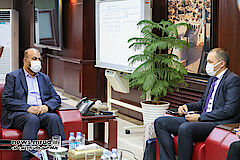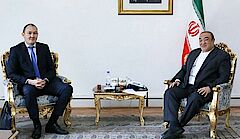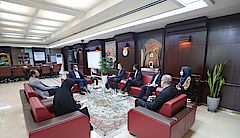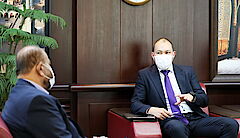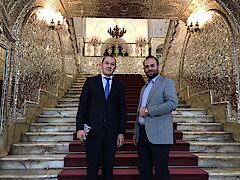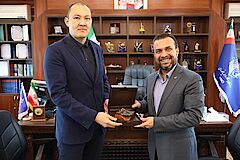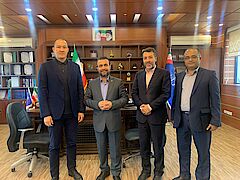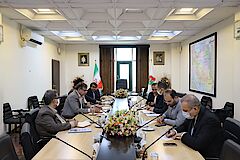On June 10-13, 2022, the official visit of Mr. A.A. Assavbayev, Secretary General of the PS IGC TRACECA to the Islamic Republic of Iran took place
Within the framework of the official visit to Iran, meetings were held with representatives of senior officials and authorities of Iran: H.E. Rostam Ghasemi, Minister of Roads and Urban Development, H.E. Ali Akbar Safaei, Deputy Minister of Roads and Urban Development and Director of Ports and Maritime Organization, H. E. Mehdi Safari, Economic Deputy, Ministry of Foreign Affairs H.E. Dariush Amani, Deputy Minister of Roads and Urban Development and Director of Road Maintanance and Transport Organization, as well as Mr. Amin Taraffo, National Secretary of TRACECA in Iran.
The main purpose of the visit is to discuss the possibilities of increasing the competitiveness of transport in the region and the attractiveness of the TRACECA corridor routes for cargo carriers.
During the exchange of views between Mr. Assavbayev and Minister H.E. Ghasemi, the issues of using safe and uninterrupted transit routes, Iran's trade and economic relations with other TRACECA member countries were touched upon, prospects and transport and transit potential of the Islamic Republic of Iran were noted.
The TRACECA SG confirmed the growing importance in the use of Iranian transit routes. "Due to geopolitical conditions, the volume of cargo through the Caspian Sea-Azerbaijan-Georgia and then the Black Sea or through Turkey to Europe and back are growing. Accordingly, it is important to diversify transport flows," he said.
A. Assavbayev added that since June, Turkmenistan has started to pass the foreign vehicles through. In this regard, he pointed out the relevance of raising awareness of carriers on the travel conditions on Uzbekistan-Turkmenistan-Iran-Turkey route, given the opportunities that Iran can provide for the development of transit.
In his turn, Minister Ghasemi noted that the Islamic Republic of Iran, along with the countries of the region, is ready to increase transit volumes and adjust tariffs, and the expansion of regional cooperation in the field of transport is one of Iran's priorities. "The TRACECA Agreement member states have special capabilities, each of which has its own characteristics and geopolitics. The issue of regional transportation both by sea and by land is possible in the interaction of countries with each other. The Islamic Republic of Iran, as a TRACECA member, has its own peculiarities in the North-South corridor, the East-West corridor, as well as in the maritime sector in the waters of Mazandaran and the southern waters of the country," the Minister added.
In addition, the possibilities of Iran's acceding to the TRACECA Multilateral Permits System, evaluation of the checkpoints’ performance, application of the Hotline Concept, etc. were discussed. The role of digitalization and PS TRACECA's readiness to assist countries, including Iran, in the implementation and application of eTIR, eCMR in international transport, as well as the creation of the TRACECA digital ecosystem were noted.
Within discussions on eliminating bottlenecks, the meeting participants discussed the possibility of taking joint measures, including ensuring the connectivity of Iran's ports, by launching regular sea services on the Caspian Sea, adopting through transit tariffs to maximize the possibilities of a land route from Central Asian countries through Iran to Turkey to Europe and vice versa.
In addition to the main issues of the activities and implementation of TRACECA initiatives, the Secretary General touched upon the issue of the research conducted by the PS in the ships’ pre-design for ferry transportation and the analysis of cargo transportation in the Caspian and Black Seas, the main purpose of which is to reduce the cost of transportation.
During the discussions, H.E. Ali Akbar Safaei, Deputy Minister and Director of Ports and Maritime Organization stressed that Iran's ports are fully ready to provide high-quality services to companies, ships and shippers in the Caspian Sea.
H. E. Mehdi Safari, Deputy Foreign Minister for Economic Affairs also confirmed the importance of maximizing the use of Iran's transit routes for the transportation of goods from Central Asian countries to Europe.
The programme of the TRACECA Secretary General's visit to Iran included a visit to Iran's largest oil loading port on the Caspian Sea, Neka, as well as the port of Amirabad, one of the largest and most modern developing ports in northern Iran, on the southern shore of the Caspian Sea with an advantageous geographical location.
Mr. A. Assavbayev got acquainted with the infrastructure of the Amirabad port, visited the railway ferry pier under construction and the meteorological center. "Saving the cost and time of transit of goods with the highest security in the region, the willingness to provide special services to applicants for transit of goods from Amirabad and provide appropriate discounts on tariffs is one of the important advantages of choosing this route," Mohammad Ali Asl Saeedipour, Director General of Ports and Seaports of Amirabad said.
The most important feature of Amirabad port is the fact that it is the only northern port of Iran connected to the railway network. In 1997, the Supreme Council of Free Zones approved this zone as a special economic zone. The port has been operating since 2001.
The Islamic Republic of Iran (IRI) has been a full member of the TRACECA Basic Multilateral Agreement (MLA) since 2009.
Country:
Mode:
Published:
Permanent Secretaritat of the IGC TRACECA






